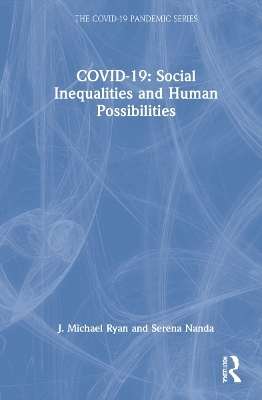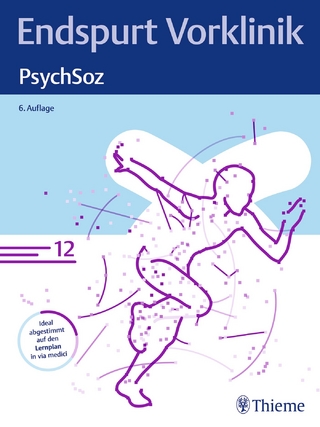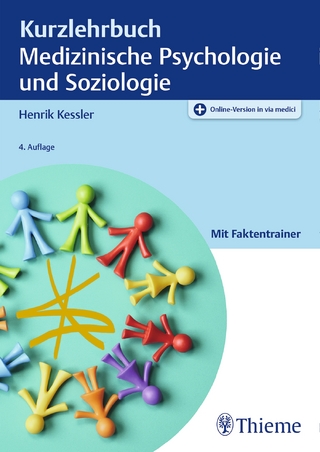
COVID-19: Social Inequalities and Human Possibilities
Routledge (Verlag)
978-1-032-01278-0 (ISBN)
COVID-19: Social Inequalities and Human Possibilities examines the unequal impact of the COVID-19 pandemic on individuals, communities, and countries, a fact seldom acknowledged and often suppressed or invisible. Taking a global approach, this book demonstrates how the impact of the pandemic has differed as a result of social inequalities, such as economic development, social class, race and ethnicity, sex and gener, age, and access to health care and education.
Economic inequality between and within nations has significantly contributed to the chances of individuals contracting and dying from the virus. Developing nations with weak health care systems, workers whose jobs cannot be performed remotely, the differences between those with and without access to soap and water to wash their hands, or the ability to practice physical distancing also account for the unequal impact of the virus. Racial and ethnic minorities experience higher death rates from the virus, which has also unequally affected indigenous peoples and urban and foreign migrants around the world. Inequality is also embedded in national and international responses to the pandemic, as giving and receiving aid is often impacted by inequalities of demographic and national power and influence, resulting in national and global competition rather than the collaboration needed to end the pandemic.
Along with the other titles in Routledge’s COVID-19 Pandemic series, this book represents a timely and critical advance in knowledge related to what many believe to be the greatest threat to global ways of being in more than a century. COVID-19: Social Inequalities and Human Possibilities is therefore indispensable for academics, researchers, and students as well as activists and policy makers interested in understanding the social impact of the COVID-19 pandemic and eradicating the inequalities it has exacerbated.
J. Michael Ryan is Associate Professor of Sociology at Nazarbayev University, Kazakhstan. Dr. Ryan was previously a researcher for the TRANSRIGHTS Project at the University of Lisbon, Portugal, and has taught courses at the American University in Cairo, Egypt, Facultad Latinoamericana de Ciencias Sociales (FLACSO), Ecuador and the University of Maryland, USA. Before returning to academia, Dr. Ryan worked as a research methodologist at the National Center for Health Statistics in Washington, DC. His research interests include social scientific responses to the COVID-19 pandemic, trans identity, and gender and sexualities. He is the editor of COVID-19: Global Pandemic, Societal Responses, Ideological Solutions (Routledge 2021), COVID-19: Social Consequences and Cultural Adaptations (Routledge 2021), Trans Lives in a Globalizing World: Rights, Identities, and Politics (Routledge 2020), and Core Concepts in Sociology (Wiley 2019). He is also the editor of Routledge’s TheCOVID-19 Pandemic series. Serena Nanda is Professor Emeritus of Anthropology at the John Jay College of Criminal Justice at the City University of New York, USA. Her research interests include the hijras, gender and sexuality, love and marriage, legal pluralism, museum studies, social science teaching, and the impact of COVID-19. Her books include Love and Marriage: Cultural Diversity in a Changing World (Waveland Press 2019), Gender Diversity: Crosscultural Variations (Waveland Press 2014) and Neither Man nor Woman: the Hijras of India (Wadsworth Publishing 1998), which won the 1990 Ruth Benedict Prize. She is also co-author of Cultural Anthropology (Sage 2019) and Culture Counts: A Concise Introduction to Cultural Anthropology (Sage 2021), and a contributor to COVID-19: Global Pandemic, Societal Responses, Ideological Solutions (Routledge 2021).
1. Introduction to a global pandemic 2.Pandemic numbers, consequences, and contradictions 3. The haves and never hads 4. Global inequities: a tale of two pandemics 5. Citizenship, migration, and legal belonging 6. Vulnerable and minority populations 7. Culture counts 8. To learn or not to learn? 9. Digital inequalities: exacerbating the divide 10. Politics and ideologies 11. Grey skies are gonna clear up? 12. Vaccines: are we really all in this together? 13. (Re-)building a post-pandemic world
| Erscheinungsdatum | 15.03.2022 |
|---|---|
| Reihe/Serie | The COVID-19 Pandemic Series |
| Verlagsort | London |
| Sprache | englisch |
| Maße | 156 x 234 mm |
| Gewicht | 453 g |
| Themenwelt | Sachbuch/Ratgeber ► Gesundheit / Leben / Psychologie |
| Studium ► 1. Studienabschnitt (Vorklinik) ► Med. Psychologie / Soziologie | |
| Studium ► Querschnittsbereiche ► Prävention / Gesundheitsförderung | |
| Sozialwissenschaften ► Soziologie | |
| ISBN-10 | 1-032-01278-1 / 1032012781 |
| ISBN-13 | 978-1-032-01278-0 / 9781032012780 |
| Zustand | Neuware |
| Haben Sie eine Frage zum Produkt? |
aus dem Bereich


